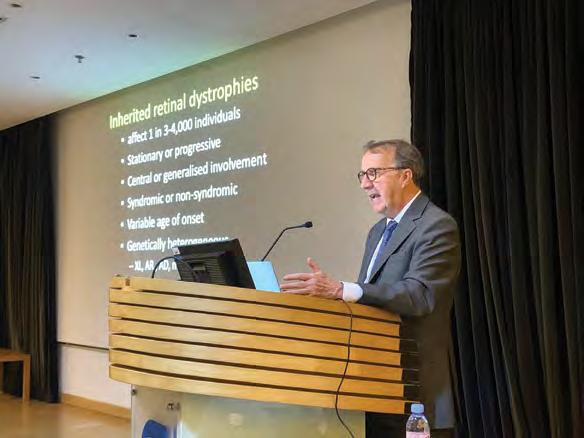
2 minute read
Teaming Up with WORLDRENOWNED EXPERTS
Two visiting experts shared their expertise with SNEC under the Health Manpower Development Plan.
In February 2023, SNEC hosted Professor David S Friedman as a visiting expert in glaucoma under the Health Manpower Development Plan (HMDP) by the Ministry of Health (MOH). Professor Friedman is the Alfred and Diane Kaneb Chair in Ophthalmology, Director of the Glaucoma Division as well as the Medical Director of Clinical Research at Massachusetts Eye and Ear Institute. During the 5-day programme, he covered much ground with lecture topics that ranged from angle closure detection and management to community and global ophthalmology, as well as how to conduct research and tips on improving public speaking.
Advertisement
Having collaborated on several multi-centre projects, Professor Friedman was impressed by how SNEC has always been able to achieve the right balance of being competitive and collaborative. His observations and feedback during his visit have provided great insights that will guide SNEC in developing the most efficient and efficacious strategies to detect and manage glaucoma in the community. Such strategies include continually investing in implementation research to optimise screening, adapting, and improving the monitoring of patients’ conditions and follow-up systems downstream from SNEC’s increasingly successful screenings.
Ensuring it was not all work and no play, he also found time to partake in some social events such as the Glaucoma Association of Singapore (GLAS) dinner and the SNEC Annual Dinner and Dance.
From past to present: Professor Friedman caught up with friends from SNEC and other hospitals over meals in February 2023.

Strengthening Expertise in Inherited Retinal Disease in Singapore
SNEC also welcomed Professor Anthony Moore, a world-renowned expert in inherited eye and retinal diseases, as a Visiting Expert in Medical Retina and Paediatric Ophthalmology under HMDP.


Professor Moore is Professor at the University of California, San Francisco (UCSF) and Emeritus Professor at University College London (UCL). He was previously director of the Inherited Eye Disease service at Moorfields Eye Hospital, London. His research identified genes causing eye and retinal disease, and new treatments for inherited retinal diseases (IRDs), leading to over 400 articles, 2 books and 50 book chapters. He was also UCL Institute of Ophthalmology’s clinical lead for the first successful gene therapy clinical trial for an infantile-onset form of retinal dystrophy. At UCSF, he investigated gene therapy trials for three other inherited retinal diseases. IRDs, also known as retinal dystrophies, are usually hereditary and traditionally considered “untreatable”.
But with new research, the first gene therapy treatment for an IRD was approved in 2017. SNEC-SERI have recently invested in clinical and research efforts to better understand the regional scope of IRD. SNEC’s dedicated IRD Clinic now offers specialised retinal imaging, electrophysiology, genetic

It was a great pleasure to visit Singapore and learn how SNEC is building an impressive inherited retinal disease service supported by ‘stateof-the-art’ genetic sequencing techniques. Precise molecular diagnosis is the starting point for recruiting patients to clinical trials and ultimately for developing new treatments for rare retinal disorders. This initiative will greatly benefit patients in Singapore.”
Professor Moore presented the latest findings on retinal disease at SNEC.








